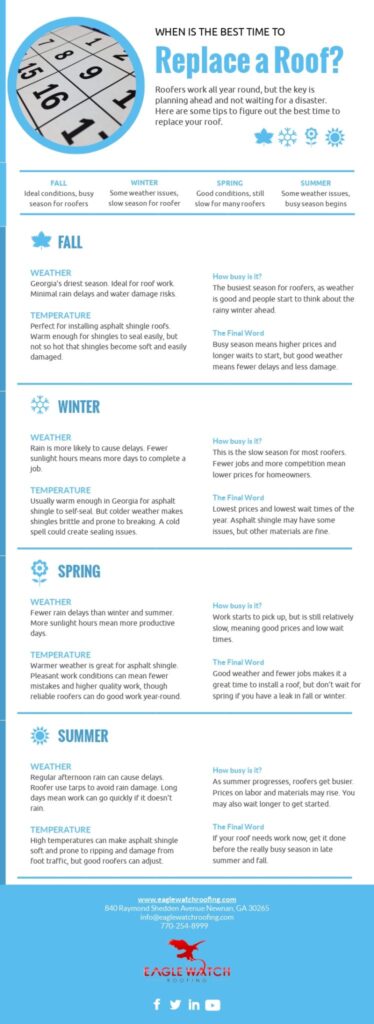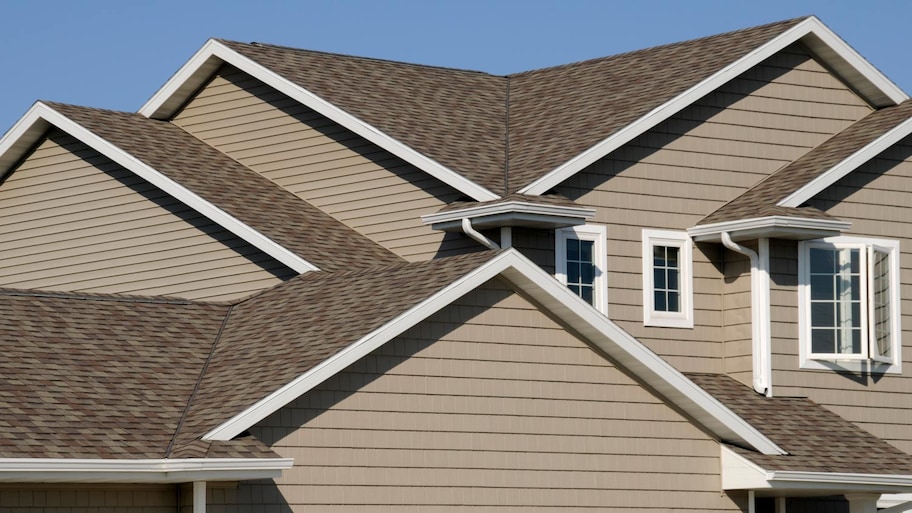If you’re considering getting your roof repaired or replaced, you may be wondering when is the optimal time to schedule the job. The answer to this question, “What is the best time of year for roofing?” varies depending on various factors such as weather conditions and availability of roofing contractors. In this article, we will explore the different seasons and their pros and cons, empowering you to make an informed decision about the best time to tackle your roofing project.

Factors to Consider
When planning a roofing project, there are several factors that you need to take into consideration. These factors will play a significant role in determining the best time of year for your roofing project. The four main factors that you should consider when deciding on the timing of your roofing project include the weather, the availability of contractors, the cost, and the project timeline.
Weather
One of the most crucial factors to consider when scheduling your roofing project is the weather. You want to choose a time of year when the weather is optimal for roofing work. Extreme weather conditions such as heavy rain, snow, or high winds can make it challenging to complete a roofing project. Therefore, it is essential to avoid scheduling your roofing project during periods of unpredictable weather. Ideally, you should choose a season when the weather is mild and stable, allowing for uninterrupted progress.
Availability of Contractors
Another important factor to consider is the availability of contractors. Roofing contractors tend to be in high demand and may have a busy schedule during peak seasons. It is important to check with local contractors to ensure they have availability to work on your project during your desired time frame. By considering the availability of contractors, you can avoid delays and ensure that your project can be completed in a timely manner.
Cost
The cost of your roofing project is another factor that you should take into account when deciding the best time of year for your project. Roofing materials and labor costs can vary depending on the time of year. In some cases, certain roofing materials may be more expensive or less readily available during specific seasons. By doing your research and planning ahead, you may be able to take advantage of cost savings by scheduling your project during a slower season for the roofing industry.
Project Timeline
Finally, you should consider your desired project timeline. If you have a strict deadline, it is important to schedule your roofing project accordingly. Keep in mind that unexpected delays, such as inclement weather, can impact the timeline of your project. By considering your project timeline and factoring in potential delays, you can choose a time of year that allows for a comfortable cushion to ensure your project is completed on time.
Spring
Advantages
Spring is often considered a favorable time for roofing projects. The weather during the spring season tends to be mild, with lower chances of extreme weather conditions. This allows for uninterrupted progress and minimizes the likelihood of weather-related delays. Additionally, the temperature during springtime is typically more comfortable for workers, which can contribute to increased productivity.
Another advantage of scheduling your roofing project for the spring is that it is a less busy season for many contractors. Demand for roofing services is often lower during this time, which means that contractors may have more availability and flexibility to work on your project. This can lead to shorter lead times and quicker completion of your roofing project.
Disadvantages
While spring offers many advantages for roofing projects, there are also some potential disadvantages to consider. One drawback is the possibility of unpredictable weather patterns, such as sudden rain showers or storms. Although the chances of extreme weather events are lower during spring, they can still occur and potentially delay your project. It is important to monitor the weather closely and have contingency plans in place to address any unexpected weather-related setbacks.
Additionally, because spring is a popular time for home improvement projects, roofing materials may be in higher demand. This increased demand can lead to potential delays in material delivery, especially if you have specific preferences for your roofing materials. It is essential to communicate your requirements with your contractor and ensure that they can source the required materials in a timely manner.

Summer
Advantages
Summer is another popular season for roofing projects. Like spring, the weather during the summer months tends to be more stable and predictable. This allows for consistent progress and minimizes the risk of weather-related delays. The longer daylight hours in summer also provide extended working hours, allowing contractors to make significant progress in a single day.
Another advantage of scheduling your roofing project for summer is the availability of contractors. Many roofing contractors have a more open schedule during the summer season, as demand for roofing services may be slightly lower compared to spring and fall. This increased availability can lead to shorter lead times, faster completion, and potentially more competitive pricing.
Disadvantages
While summer offers many advantages, there are a few drawbacks to consider. In some regions, summer can bring high temperatures and heatwaves, which can make working conditions uncomfortable for roofing crews. It is important to ensure that proper safety measures are in place to protect workers from heat-related illnesses and to adequately hydrate throughout the day.
Additionally, summer is a popular time for vacations and family activities, which can lead to potential scheduling conflicts. Coordinating with contractors and ensuring that all parties involved are available and committed to the project timeline is crucial. Effective communication and planning can help minimize any potential disruptions and ensure a smooth roofing project.
Fall
Advantages
Fall is another favorable season for roofing projects, especially in regions with mild weather conditions. The cooler temperatures of fall create comfortable working conditions for roofing crews, promoting high productivity. The weather during this season is generally more stable and predictable, reducing the chances of weather-related delays.
Another advantage of scheduling your roofing project for the fall is the availability of roofing materials. Many manufacturers offer discounts and promotions on their products during this season, allowing you to potentially save on material costs. These cost savings, combined with the availability of contractors who have more open schedules, make fall an attractive time for roofing projects.
Disadvantages
While fall offers many advantages for roofing projects, there are a few potential disadvantages to consider. One drawback is that fall is a busy season for other home improvement projects, such as landscaping or exterior painting. This increased demand for various services may result in longer lead times for contractors and potential scheduling conflicts. It is crucial to plan ahead and secure your contractor’s availability well in advance to avoid any delays.
Additionally, in some regions, fall can bring unpredictable weather patterns such as rain showers or early snowfall. It is essential to monitor the weather forecast closely and have contingency plans in place to address any unexpected weather-related setbacks.

Winter
Advantages
Winter is generally considered the least favorable season for roofing projects. However, there are a few advantages to scheduling your roofing project for the winter months. One significant advantage is the potential cost savings. Since winter is the least busy season for roofing contractors, they may offer discounts or competitive pricing to generate business. This can result in cost savings for your roofing project.
Another advantage of winter roofing projects is the potential availability of contractors. With fewer projects scheduled during winter, many roofing contractors have more open schedules and can accommodate your project more easily. This increased availability can lead to shorter lead times and faster completion of your roofing project.
Disadvantages
Despite the potential advantages, winter roofing projects come with several disadvantages that need to be carefully considered. The most prominent disadvantage is the unpredictable and harsh weather conditions that winter brings. Snow, ice, and freezing temperatures can make it challenging to perform roofing work safely and efficiently. It is essential to work with experienced contractors who are familiar with winter roofing practices and take the necessary precautions to ensure worker safety.
Furthermore, winter roofing projects may lead to higher material costs. Some roofing materials may be more challenging to source during the winter months or may require additional precautions for installation to withstand the cold temperatures effectively. These factors can contribute to increased material costs and potentially longer project timelines.
Considerations for Different Regions
Northern Regions
In northern regions with cold, snowy winters, it is generally advisable to avoid scheduling roofing projects during the winter months. The extreme weather conditions can make it difficult to carry out roofing work safely and efficiently. Additionally, the potential risks associated with working in freezing temperatures can be a significant concern. Instead, spring and summer are the more favorable seasons for roofing projects in northern regions.
Southern Regions
In southern regions with hot and humid summers, scheduling roofing projects during the summer months may not be ideal due to the extreme temperatures. High heat and humidity can make working conditions uncomfortable and potentially pose health risks for the roofing crews. As a result, fall and spring are usually the recommended seasons for roofing projects in southern regions, as the weather tends to be milder and more manageable.
Coastal Regions
Coastal regions often experience unique weather conditions due to their proximity to the ocean. Sea breezes and higher moisture levels can impact roofing projects in coastal areas. It is important to consider the specific climate patterns and weather forecasts for a particular coastal region when scheduling your roofing project. Additionally, ensuring that proper materials and techniques are used to withstand the coastal elements, such as saltwater corrosion, is crucial for the longevity of the roof.
Inland Regions
Inland regions may have varying weather patterns depending on their geographical location. It is essential to consider the specific climate conditions and weather forecasts for the area when scheduling a roofing project. The general guidelines for roofing in inland regions align with the seasons outlined earlier. Spring and fall are typically the most favorable seasons for roofing projects, while summer and winter may pose specific challenges depending on the regional climate.

Scheduling Roofing Projects
Planning Ahead
To ensure a successful roofing project, it is crucial to plan ahead. Start by determining your project’s scope and timeline. Consider any specific requirements you may have, such as the desired roofing materials or the need for additional permits. By mapping out your project early on, you can allocate ample time for research, budgeting, and contacting contractors.
Considering the Demand
It is important to consider the demand for roofing services in your area when scheduling your project. Different seasons can fluctuate in terms of demand, with some being busier than others. Take into account the typical peak seasons for roofing projects and plan accordingly. By scheduling your project during a less busy season, you may be able to secure the services of a reliable roofing contractor more easily.
Working with Contractors
When scheduling a roofing project, open communication with contractors is key. Reach out to multiple contractors to obtain estimates and gauge their availability to align with your desired timeline. Consider the reputation, experience, and expertise of the contractors before making a final decision. It is also essential to discuss any potential delays and contingency plans to ensure a smooth and successful project.
Conclusion
Determining the best time of year for your roofing project involves careful consideration of various factors. The weather, availability of contractors, cost, and project timeline should all be weighed when making your decision. While each season has its advantages and disadvantages, there is no one-size-fits-all answer. The optimal time for your roofing project will vary depending on your location, climate, and personal preferences. By thoroughly considering these factors and working closely with reputable contractors, you can ensure a successful roofing project that meets your specific needs and preferences.
